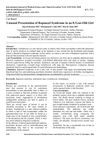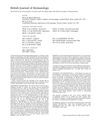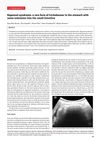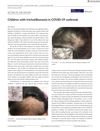 January 2005 in “Korean Journal of Psychosomatic Medicine”
January 2005 in “Korean Journal of Psychosomatic Medicine” Women with alopecia often experience high levels of anxiety and depression, needing psychiatric help.
[object Object] 79 citations,
January 2000 in “Annals of Clinical Psychiatry” Some psychiatric medications can cause hair loss, but stopping or reducing the dose usually reverses it.
 63 citations,
March 2000 in “Annals of clinical psychiatry”
63 citations,
March 2000 in “Annals of clinical psychiatry” Some psychiatric medications can cause hair loss, but it usually grows back after adjusting the medication.
 30 citations,
May 1991 in “Psychosomatics”
30 citations,
May 1991 in “Psychosomatics” Some psychiatric medications can cause reversible hair loss.
 16 citations,
July 1996 in “Dermatologic Clinics”
16 citations,
July 1996 in “Dermatologic Clinics” Some psychiatric drugs can cause skin problems, but serious reactions are rare.
 December 2024 in “Brazilian Journal of Hair Health”
December 2024 in “Brazilian Journal of Hair Health” Treating both bipolar disorder and hair-related BDD with psychiatric medications improved the patient's symptoms.
 December 2020 in “International journal of medical science and clinical invention”
December 2020 in “International journal of medical science and clinical invention” Rapunzel syndrome can show vague symptoms and needs long-term psychiatric care to prevent recurrence.
 35 citations,
August 2004 in “Epilepsy & behavior”
35 citations,
August 2004 in “Epilepsy & behavior” Extended-release divalproex is better tolerated and more effective for seizures and psychiatric symptoms than delayed-release divalproex, but doesn't reduce hair loss.
January 1999 in “대한피부과학회지” Trichotillomania is more common in young females and often linked to stress and psychiatric conditions, with hair loss and increased catagen hair observed.
 18 citations,
June 2019 in “Twin research and human genetics”
18 citations,
June 2019 in “Twin research and human genetics” The 25Up study collected extensive data on mental disorders and related factors in Australian twins and siblings to investigate the genetics of psychiatric illnesses.
 September 2024 in “Pediatrics in Review”
September 2024 in “Pediatrics in Review” A trichobezoar caused the girl's recurrent intussusception, and surgery plus psychiatric therapy resolved her symptoms.
[object Object] 
Abortion access should be defended on public health grounds, and medical evaluations are crucial in psychiatric cases to avoid misdiagnosis.
January 2023 in “Dermatologic Therapy” Androgenetic alopecia significantly affects mental health and quality of life, highlighting the need for psychiatric evaluations.
 13 citations,
October 2004 in “Anais Brasileiros De Dermatologia”
13 citations,
October 2004 in “Anais Brasileiros De Dermatologia” The document concludes that compulsive hair disorders, like trichotillomania, are complex and require careful diagnosis and treatment from both psychiatric and dermatological perspectives.
7 citations,
March 2018 in “Psychiatry and Clinical Psychopharmacology” Valproate can cause brain swelling with high ammonia levels, possibly underreported, especially in psychiatric patients.
 1 citations,
October 2022 in “Cureus”
1 citations,
October 2022 in “Cureus” Patients with chronic skin disorders often experience depression, anxiety, and reduced quality of life and may benefit from psychiatric help.

A man wrongly believed he had parasites, showing that delusional infestation can affect men and is often linked with other psychiatric issues, but can be treated with antipsychotics.
 100 citations,
July 2018 in “Journal of The American Academy of Dermatology”
100 citations,
July 2018 in “Journal of The American Academy of Dermatology” People with alopecia areata often have other health issues like skin diseases, metabolic syndrome, stomach infections, lupus, anemia, thyroid problems, mental health issues, vitamin D deficiency, and hearing and eye problems.
 86 citations,
May 2013 in “American journal of obstetrics and gynecology”
86 citations,
May 2013 in “American journal of obstetrics and gynecology” Gynecologists should provide comprehensive care for transgender patients, including mental health evaluation, hormone therapy, and surgical options, while monitoring for side effects and ensuring patient safety.
 52 citations,
October 2016 in “Clinics in Dermatology”
52 citations,
October 2016 in “Clinics in Dermatology” Some medications can cause acne, and stopping these drugs is the main treatment.
 35 citations,
September 2017 in “PubMed”
35 citations,
September 2017 in “PubMed” The document concludes that hair loss has many causes and treatments vary, including medication for pattern baldness and addressing underlying issues for other types.
 29 citations,
January 2007 in “American Journal of Clinical Dermatology”
29 citations,
January 2007 in “American Journal of Clinical Dermatology” Eyebrow loss has many causes and requires accurate diagnosis for proper treatment.
21 citations,
March 2018 in “JEADV. Journal of the European Academy of Dermatology and Venereology/Journal of the European Academy of Dermatology and Venereology” 5-alpha-reductase inhibitors may help stabilize or slow down hair loss in some frontal fibrosing alopecia patients, but more research is needed to confirm their effectiveness and safety.
 21 citations,
January 1988 in “Stress Medicine”
21 citations,
January 1988 in “Stress Medicine” Stress affects skin health and emotional well-being should be considered in skin disease treatment.
 20 citations,
August 2018 in “Clinics in Dermatology”
20 citations,
August 2018 in “Clinics in Dermatology” The conclusion is that understanding and addressing the psychological effects of alopecia areata is important for effective treatment.
 18 citations,
November 2000 in “British Journal of Dermatology”
18 citations,
November 2000 in “British Journal of Dermatology” Many skin patients have mental health issues, so dermatologists should consider psychological care.
 15 citations,
May 2017 in “JEADV. Journal of the European Academy of Dermatology and Venereology/Journal of the European Academy of Dermatology and Venereology”
15 citations,
May 2017 in “JEADV. Journal of the European Academy of Dermatology and Venereology/Journal of the European Academy of Dermatology and Venereology” High-dose corticosteroids and methotrexate had a modest effect on severe childhood alopecia, but side effects and relapse were concerns.
 12 citations,
May 2017 in “Medicine”
12 citations,
May 2017 in “Medicine” Oral isotretinoin was recommended for a 21-year-old woman with severe acne.
 6 citations,
January 2018 in “Acta dermatovenerologica Alpina, Pannonica et Adriatica (Tiskana izd.)”
6 citations,
January 2018 in “Acta dermatovenerologica Alpina, Pannonica et Adriatica (Tiskana izd.)” An 8-year-old girl with Rapunzel syndrome had a hairball removed from her stomach and intestines and recovered well after surgery.
 5 citations,
May 2021 in “Journal of Cosmetic Dermatology”
5 citations,
May 2021 in “Journal of Cosmetic Dermatology” More children are showing signs of hair-pulling disorders during the COVID-19 pandemic due to stress and lack of social interaction.

























